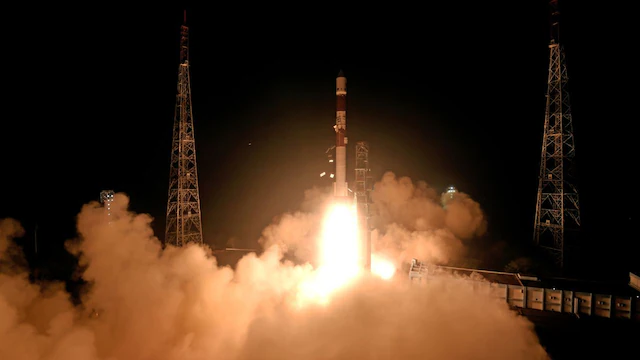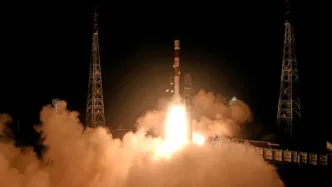
Web Summit Qatar 2025 made history in Doha, bringing together over 255,000 people from 124 countries—making it the largest startup and tech gathering in the MENA region. With more than 1,500 startups and 723 investors participating, the event buzzed with innovation, new partnerships, and groundbreaking ideas.
Among the key themes discussed was the space tech sector. CNBC-TV18’s Shruti Mishra sat down with Adam Niewinski, Co-Founder and General Partner at OTB Ventures, to explore why space tech is becoming increasingly attractive to venture capitalists and how it’s set to transform industries beyond Earth.
The $6 billion Investment Surge
Space tech startups secured $6 billion in venture capital funding in 2024, but Adam Niewinsk believes this is just the beginning.
“I do believe that this is the next big thing… The number for 2024 it’s not that big. I believe it’s going to be much bigger soon,” he stated, referencing a McKinsey report suggesting potential investment growth to $60 billion.
According to Niewinsk, the key shift is that space technology is no longer solely government funded. While governments pioneered applications like GPS navigation and satellite communication, corporations are increasingly using space technology data in daily operations.
Geopolitical Dynamics Driving Growth
Geopolitical competition has historically accelerated space innovation, from the US-Russia space race to today’s multi-nation ventures. Mr. Adam Niewinski emphasised that countries must participate in space technology development to remain relevant:
“You need to be in AI, you need to be in space. If you do not have your own launchers, if you do not have your own satellite communication, if you are not playing a part of this game, then you will be nowhere in 10 to 20 years’ time.”
Cost Reduction: Game-changer for Commercialisation
Advancements in rocket technology have dramatically reduced costs, making space more commercially viable. Adam Niewinsk highlighted how a synthetic aperture radio satellite that once cost $300-500 million can now be built and launched for $25 million, enabling more frequent data collection with larger satellite constellations.
Government-private Sector Partnership
Despite growing private investment, Niewinsk believes governments still play a crucial role in space tech development. He emphasized that governments possess the long-term vision necessary to support R&D, which ultimately benefits the entire economic ecosystem.
According to him, this government support is essential since investors typically lack the patience required for extended development cycles in the space sector.
Investment Strategy: Near-term Commercialisation
When asked about OTB Ventures’ investment approach, Niewinsk revealed they focus on companies with commercialization potential within a few years. The firm prioritizes understanding who the paying customers will be and when services can be delivered.
While they appreciate visionary founders, he noted that they need to see a clear path to execution and commercialization within reach. He stated plainly that concepts like lunar hotels remain too distant for current investment consideration.
Space Manufacturing: The New Frontier
Niewinsk is particularly excited about in-space infrastructure and manufacturing. He described how manufacturing in zero gravity enables the creation of entirely new materials with applications in pharmaceuticals and fiber optics.
This emerging field requires supporting technologies like precise rendezvous systems that can connect objects moving at high speeds in space, as well as return vehicles capable of safely bringing space-manufactured products back to Earth.
Challenges: Space Debris and Regulation
According to Niewinsk, the biggest challenge facing the space tech industry is space debris. This growing problem threatens operational satellites and creates shorter launch windows for rockets.
“It’s all the dirt and all the debris, which is flying, and this is creating a huge risk for any player in the space tech economy,” he warned, calling for international cooperation to address the issue.
Transforming Industries on Earth
Niewinsk sees space tech revolutionizing numerous Earth-bound industries, from precision agriculture to insurance. Satellite monitoring can detect plant water stress by measuring temperature with one-tenth of a degree precision, potentially increasing crop yields while conserving resources. He emphasized:
“You cannot really understand what’s happening on Earth from within—you need to look at it from up there.”
India’s Space Program: Efficiency and Innovation
Regarding India’s space achievements, including Chandrayaan-3, Mr. Adam Niewinsk praised the remarkable efficiency and cost-effectiveness of the missions. He underlined that these significant accomplishments stand out particularly because of the resource-efficient approach taken.
According to him, India’s success serves as an inspiration to other countries by demonstrating what can be accomplished with vision, technical talent, and efficient resource utilization rather than simply overspending.
As space tech continues evolving from government projects to commercial ventures, Niewinsk encourages founders to embrace visionary thinking and boldness. He acknowledges that the space sector presents significant challenges.
However, these difficulties attract exceptional talent and create opportunities for breakthroughs benefiting both commercial interests and societal needs.
Content Courtesy – CNBC











